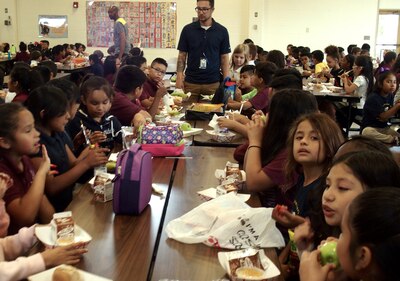Shelby County Schools and the state-run Achievement School District will close starting Friday and reopen March 30, a week after spring break, because of “rapidly changing conditions” of COVID-19, the local district said.

The extended closure for health and safety concerns raises a new wave of concerns for parents, including where to find childcare or get meals. During spring break, many parents were planning to send their children to the Shelby County Schools’ new spring break academy for small group learning, but that is also canceled.
The decision to close schools came a couple hours before Gov. Bill Lee declared a state of emergency and said any shutdowns or cancelations should be left up to local districts, institutions, and businesses.
“Every situation’s different. Every decision is different,” the governor said.
Shelby County Schools is the fourth district in Tennessee to cancel classes amid coronavirus worries, but is the longest closure so far, a day longer than two weeks. On Wednesday, districts in Nashville, Williamson County, and Franklin announced they would close the rest of the week and into spring break, but will return the week after.
The Memphis district’s planned spring break would have started Monday, and staff was already scheduled to deep clean all schools.
Thursday’s announcement came the morning after President Trump announced a travel ban to and from Europe, the World Health Organization declared a worldwide pandemic, and a Memphis employee who had been quarantined for coming in contact with the area’s first case was cleared by the county health department to go back to work. Also Thursday, Shelby County health officials confirmed a second case of the coronavirus. The two infected individuals are friends, over 40 years old, who traveled together to Mardi Gras in New Orleans.
Health officials said Shelby County Schools officials contacted them to advise them of their plans to close, but the district was not directed to do so. “Their decision was in alignment with what academic institutions are doing,” said Alisa Haushalter, director of the Shelby County Health Department.
Closing schools allows students to stay home and reduce transmission while giving schools time to do extra cleaning and planning to prepare for the possibility of a longer closure, she said.
“Due to national developments and rapidly changing conditions regarding the spread of COVID-19, we feel this is the best course of action,” said Superintendent Joris Ray. “Closing schools is never a decision that we take lightly.”
Ray said the district’s central office and administrative buildings will remain open except on March 19-20. All school employees will be paid during the extended break. While closed, the district plans to “conduct a full assessment of risks for students and staff who will be traveling during spring break and perform deep cleaning in all district buildings.”
That cleaning will be closely monitored by teachers, said Tikeila Rucker, the president of the United Education Association of Shelby County, adding she supports Ray’s decision.
“It is our hope that this pandemic will shed light on how important it is to be proactive in having the necessary basic cleaning supplies and hygienic resources in every school moving forward to ensure a clean, safe learning environment,” she said in a statement.
There are no confirmed COVID-19 cases connected to Shelby County Schools, but Miska Clay-Bibbs, the school board’s chairwoman, said “the cases in surrounding areas make it imperative that the district continue its proactive measures.”
Districts across the nation are grappling with whether or not to close schools amid the spread of COVID-19. Research has found that school closures during outbreaks can help contain them if done early. But closing schools also presents significant challenges for low-income families, such as finding childcare or taking days off work that may not be paid. Going without school meals provided by the district could also put some children at risk for hunger.
Memphis schools are closing for two weeks. Here are food resources to fill in the gap.
During a press conference Thursday morning, Gov. Bill Lee acknowledged the impact on students from low-income families.
“Closing a school, for example, in a district that might have a number of low-income students who receive two meals a day at school, that has a profound impact on those families,” he said.
Shelby County Schools plans to prepare take-away lunches at several locations through the county from 11 a.m. to 1 p.m. beginning March 23. Details are still being worked out, but a statement said the distribution was the “least-risky exposure” for students and families. Most of the district’s students live in poverty and depend on breakfast and lunches served at school.

Charter schools that plan to stay open will be able to access student meals through Shelby County Schools if they already do, said Brittany Monda, the district’s director of charter schools, in an email to charter leaders Thursday morning.
Although the district’s 57 charter schools are not required to close, several of the city’s largest charter school networks have elected to cancel classes, including KIPP, Freedom Preparatory Academy, Gestalt Community Schools, New Day Schools, and Memphis Business Academy. But it’s possible some may stay open for part or all of that time. Freedom Preparatory Academy plans to provide bag lunches at all its campuses starting March 23, after spring break, from 11 a.m. to noon.
Across the nation, more than 1,500 schools had closed or were scheduled to close by late Wednesday. That’s up from 500 three days ago. Education Week is keeping a running tally of schools closing for a variety of coronavirus-related reasons.
Seattle Public Schools, which sits in the U.S. state with the most coronavirus cases, announced Wednesday it would close for two weeks. The only states without reported cases, according to USA Today, are Alabama, Alaska, Idaho, Maine, Montana and West Virginia. As of Thursday afternoon, 39 people in the U.S. have died after contracting the disease.
Chalkbeat statehouse correspondent Marta W. Aldrich contributed to this story.

